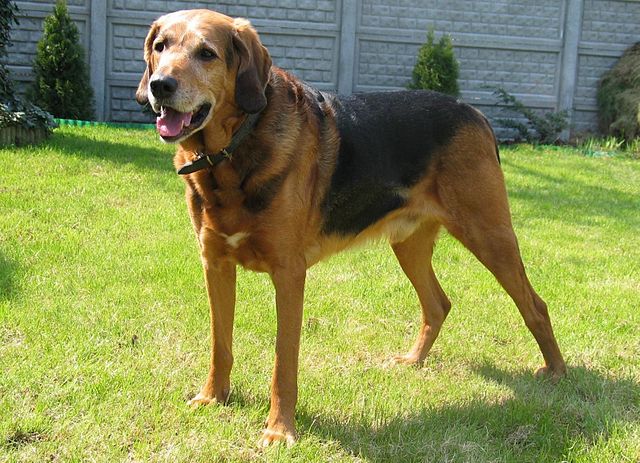The Polish Hound is a large scenthound breed with an excellent sense of smell and the ability to hunt in harsh environments. Developed in the middle ages by crossing Bloodhounds with local Polish breeds, at one point they were even owned by Polish nobility! When World War 2 occurred, many breeds saw a huge decrease in numbers and the Polish Hound was no exception. In an attempt to save the breed, two distinct types emerged – one lighter boned and the other with a heavier substance. It is the heavier strain that eventually succeeded in becoming the Polish Hound of today.
The Polish Hound is a slow-maturing breed mentally, and does have a stubborn streak to boot, but is definitely trainable. He is intelligent and enjoys pleasing his owners. When it comes to obedience training he does best when he thinks that training is all his idea! Make training fun, positive and consistent for best results. A bit of patience is a good trait for owners to have, particularly while the dog is still young and learning. He can be somewhat sensitive and does best when training is firm without being harsh. Finally, this is a breed that needs a job to do, so be prepared to provide this in the form of hunting, scentwork or general obedience.
The Polish Hound is always loyal and friendly to those whom he knows. He has a gentle nature and gets along well with children, with whom he is very patient. Likewise he gets along with other dogs and new people although does have a territorial streak for those who enter his property meaning he is somewhat protective without being overly aggressive. Think of him more as a watchdog than a guard dog. While his primary purpose is that of a hunting dog, he can make a fantastic companion as his energy level is more suitable for home living compared to other scenthounds. He is a bit of a well-kept secret outside of Poland for most people have never heard of this rare breed (recognized by the UKC but not the AKC).
Although not a hyper dog, the Polish Hound does need regular exercise. At the bare minimum, a vigorous game of fetch should be played every day combined with a nice walk. More ideally, an hour of jogging the neighborhood followed up by a romp in the fenced backyard is probably a better fit for this high-stamina hunter. As a somewhat large hunting dog, he does best living in larger spaces where he can “stretch his legs”. He doesn’t necessarily demand a giant property but apartment living is not the greatest lifestyle for him. He does best with owners that are at least somewhat active and are capable of providing both physical and mental stimulation on a regular basis. Without exercise he will get bored and most likely will become very loud!
Like any breed, the Polish Hound does have some setbacks in terms of ownership. First is his enthusiasm with using his voice, which is a trait that cannot really be trained away. This is similar to other scenthounds – complete with the extra loud voice box and a gleeful penchant for frequent baying. Second, as a hunting breed he doesn’t tend to get along well with cats unless raised with them from puppyhood. Cats that live indoors are normally safer than those who are allowed outside, as an outdoor chase is often too exciting to refuse for a Polish Hound! In addition, similar to other scenthounds he is very motivated to follow his nose after exciting scents. For this reason he must be kept within the confines of a fence when not on leash.
Polish Hounds live, on average, 13-14 years. They are a very healthy breed in general and are easy to care for in terms of both health and grooming. With brushing, a once-a-week session should be sufficient to remove dead hair. On rare occasions he’ll need a bath if he’s been getting himself muddy. Make sure to clean the ears each week and check for infections – particularly if the dog often hunts or plays in heavy brush. Overall these are all easy grooming tasks that most dog owners can accomplish. Health wise, the breed isn’t known for any specific health issues although it’s not a bad idea to take precautions against bloat as they are a deep-chested breed. Bred to work long hours in adverse conditions, the breed evolved into a hardy and low-maintenance animal.

Photo CC BY 2.5
